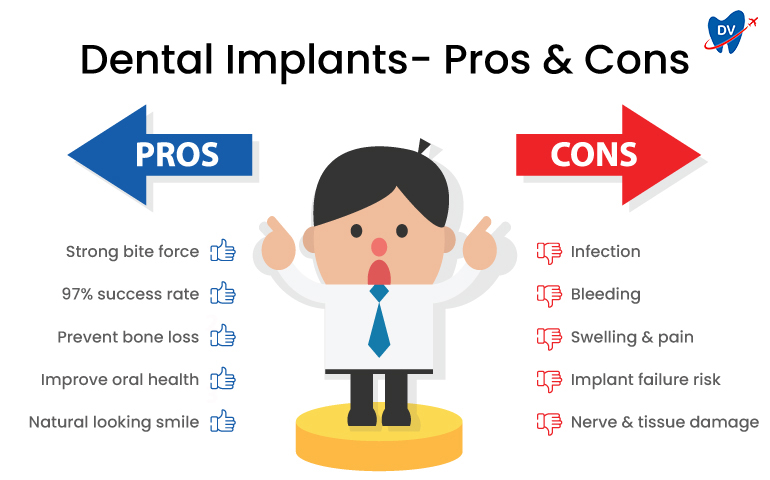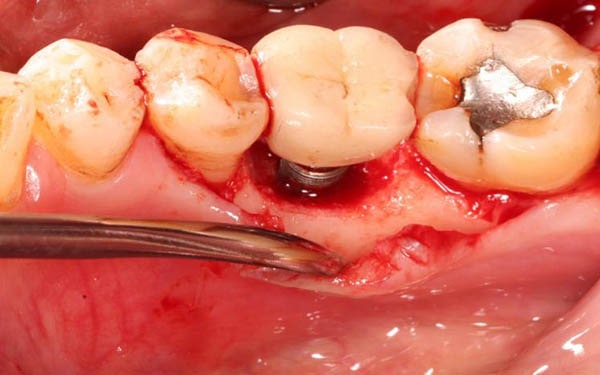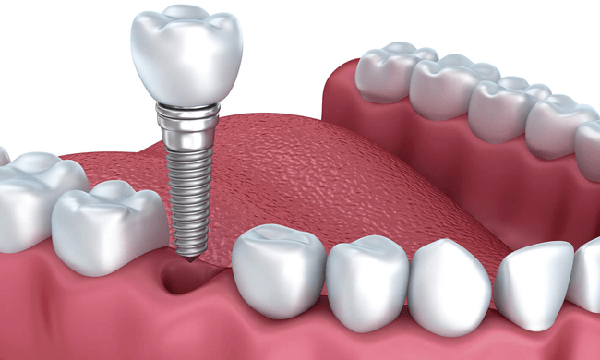Contents
Pros and Cons of Dental Implants
Implant is a dental restoration method that involves placing implant posts (artificial tooth roots) into the jawbone to replace real tooth roots. Porcelain crowns, similar to real teeth, are then attached to the top of the posts. This is considered the most advanced denture implant method in modern medicine and is effective in restoring most cases of tooth loss.

Advantages of Dental Implants
Dental implants are a popular choice for those looking to improve their smile due to the following advantages:
Complete restoration of missing teeth
Dental implants offer a unique advantage over most current methods of restoration, which only address missing crowns. While crowns are certainly an important part of the tooth, the root is equally crucial. By comprehensively restoring both the root and crown, dental implants offer a more complete solution that can help individuals eat comfortably and communicate confidently with others. This is because dental implants are designed to mimic the natural tooth, both in terms of appearance and function. The implant post serves as the root of the tooth, providing a stable foundation for the dental crown. This not only allows for more comfortable eating, but also a more natural-looking smile that can help boost self-confidence. So if you’re looking for a comprehensive solution to missing teeth, dental implants may be the perfect choice for you.
Enhance Chewing Function
There are various teeth restoration methods available, but each comes with its own set of limitations. Removable dentures, for example, can cause discomfort when eating chewy or hard foods. Similarly, porcelain bridges require you to avoid very hot or cold foods due to increased tooth sensitivity after being sharpened.
Fortunately, dental implants offer a more comfortable solution for enjoying your favorite foods. Whether it’s tough meats or hard candies, dental implants allow you to chew and bite without any discomfort. In fact, dental implants are designed to function just like your natural teeth, giving you the freedom to eat whatever you want with confidence.
Ensure Aesthetics
They are made up of two parts: the implant post and the porcelain crown. The implant post is inserted into the jaw bone, providing a stable foundation for the crown. The porcelain crown is custom-made to match the color and shape of the surrounding teeth, creating a seamless and natural appearance. Despite the advantages of dental implants, some people may be hesitant to get them due to the fear of not looking natural. However, with advanced technology and techniques, dental implants can now be virtually indistinguishable from natural teeth, giving people the confidence to smile and speak without hesitation.
Prevent Jaw Bone Loss
When a tooth is missing, the jawbone in the area of the gap can begin to deteriorate due to a lack of stimulation, which can lead to a sunken appearance in the face and even difficulty eating or speaking. However, dental implants offer a solution that not only replaces the visible tooth but also the root beneath the gum line. By mimicking the natural tooth root, the implant provides the necessary stimulation to the jawbone, preventing bone loss and maintaining the structure of the face. This means that dental implants not only restore the appearance and function of the missing tooth but also promote long-term oral health. So, it’s a wise decision to opt for dental implants instead of removable dentures and porcelain bridges which do not provide the same level of impact and stimulation to the jawbone.
Maximizing Preservation of Natural Teeth
When considering options for restoring lost teeth, porcelain bridges and dental implants are two common options. Porcelain bridges require the grinding down of two adjacent teeth to create pillars for the bridge to be attached to. However, it is important to note that the teeth that have been ground down cannot be restored to their original state and may be more susceptible to sensitivity. This sensitivity may limit your ability to enjoy certain foods.
On the other hand, dental implants do not require the grinding down of adjacent teeth, which helps preserve as many natural teeth as possible. While the process for getting dental implants is more involved, as it requires the placement of a titanium post into the jawbone, the end result is a fully functional tooth replacement. Additionally, dental implants can help prevent the bone loss that can occur when a tooth is missing for a prolonged period of time.
Durability
Implant teeth are a great investment for those who want to keep their teeth strong and healthy for a long time. They are incredibly durable, which means you can enjoy your favorite hard and chewy foods without worrying about damaging them. In addition, with proper care, implant teeth can last a lifetime and even become permanent fixtures in your mouth. This means that you can have a beautiful, natural-looking smile that lasts for years to come, without the need for any additional dental work. With implant teeth, you can feel confident in your ability to eat, speak, and smile without any concerns about your dental health.
Safe and Benign
Implant teeth are a dental treatment that involves the use of titanium posts, abutment joints, and porcelain crowns. These materials are safe and medically approved, making implant teeth a highly safe option for patients. In fact, due to the biocompatibility of titanium, there is a lower risk of rejection or allergic reactions when compared to other dental treatments. Additionally, implant teeth offer a more natural look and feel compared to dentures or bridges, as they are designed to integrate with the patient’s existing bone structure. This integration also provides a stable foundation for the implant teeth, allowing for improved speech and chewing ability. Overall, implant teeth are an excellent option for those seeking a long-term solution for missing or damaged teeth, as they can last for many years with proper care and maintenance.

Drawbacks of Dental Implants
Dental implants have been widely used in healthcare to improve patient outcomes. While these devices have shown great promise in treating a variety of conditions, they still have certain limitations that need to be considered.
Extended Treatment Time
The dental implant process is a highly individualized procedure, and the time required for it can vary from person to person. Typically, the average dental implant process takes between 3 to 6 months. However, depending on the severity of the dental issue, such as tooth pulp, tooth decay, jaw bone loss, or other conditions, the process may take even longer than that. It is important to note that the timeframe for dental implantation can be influenced by several factors, such as the quality of the patient’s bone, the type of implant used, and the patient’s overall health.
While dental implantation is an effective solution for restoring a patient’s teeth, it may not be suitable for people who need to restore their teeth urgently or for those with busy schedules, upcoming business trips, or extended travel plans. This is because the process requires a significant amount of time and dedication to ensure that the implant is properly integrated into the patient’s jawbone.
Cannot be Applied for All Cases
Dental implants are a popular way to restore lost teeth, but it’s crucial to note that this procedure requires stable health. Patients who are considering dental implants should consult with their dentist and also undergo a thorough medical evaluation to ensure that they are good candidates for the procedure. Unfortunately, dental implants may not be suitable for patients with metastatic cancer, as their health may be too compromised to undergo the procedure safely. Additionally, age can also be a factor, as older patients may have weaker jawbones or other health conditions that make dental implant surgery too risky. Overall, while dental implants can provide a long-lasting and natural-looking solution for tooth loss, it’s important to carefully consider one’s health and candidacy before undergoing the procedure.
High Cost
Another disadvantage of dental implants is the cost. Compared to other tooth restoration methods such as porcelain bridges and removable dentures, dental implants are more expensive. In some cases, insurance may cover a portion of the cost, but it is important to discuss this with your insurance provider.
The high cost of dental implants may be a disadvantage for those who are on a tight budget or do not have insurance coverage. However, it is important to consider the long-term benefits of dental implants, such as improved oral health and a more natural-looking smile.
Must Be Performed by a Highly Qualified Doctor
Dental implantation is a complex and intensive procedure that requires a highly qualified doctor. The dentist needs to be properly trained and experienced to be able to place the implant correctly into the jawbone. If the implant is not placed correctly, it can cause complications such as infection, nerve damage, or implant failure.
It is important to do your research and choose a dentist who has experience in dental implantation and a good track record of successful outcomes. Going to an inexperienced or unqualified dentist can lead to complications and may require additional dental work to correct.
Require Modern and Specialized Equipment
Implanting dental implants is a complex procedure that requires not only highly skilled professionals but also a modern operating room and specialized tools. The dental clinic must be equipped with a state-of-the-art Implant drill set, a Healing cap, and a 3D CT Conebeam X-ray machine, among other things. By using these tools, the dental implant specialist can accurately assess the patient’s oral condition, identify potential complications, and plan the treatment accordingly.
Moreover, the use of advanced technology in implant dentistry has made the procedure safer and more effective than ever. With the help of computer-guided implant surgery, for instance, the dentist can place the implant with great precision, reducing the risk of damage to the surrounding tissue and ensuring optimal placement. Additionally, the use of digital imaging technology allows the dentist to visualize the patient’s oral anatomy in 3D, making it easier to plan the implant placement and achieve the desired results.
While dental implants offer several advantages such as improved chewing function and long-term oral health, they also have their disadvantages. The extended treatment time, high cost, and requirement for a highly qualified doctor are some of the drawbacks that you should be aware of before making a decision. It is important to discuss your options with your dentist and weigh the pros and cons to determine if dental implants are the right choice for you.















